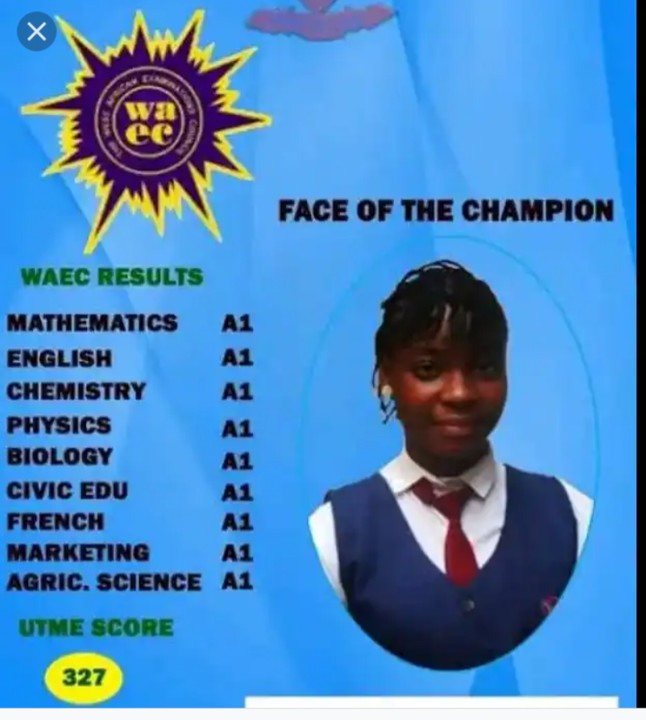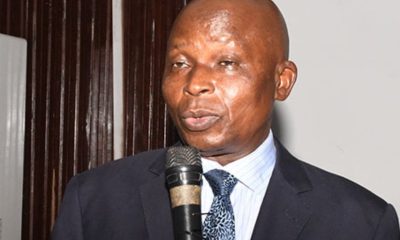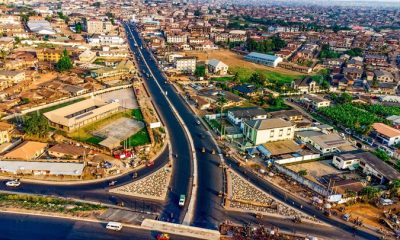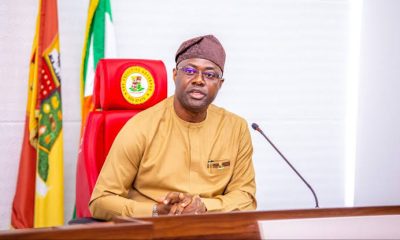Education
Save public primary schools from infrastructural decay, Stakeholders tell Oyo govt

Stakeholders in the education sector have called on Oyo State Government to take urgent steps to save public primary schools across the state from infrastructural decay and its dire consequences.
Parents, teachers and other stakeholders made the call in separate interviews with the News Agency of Nigeria (NAN) in Ibadan on Sunday.
A survey by NAN revealed that most of the public primary schools in the state undergo their teaching and learning activities under dilapidated structures.
The schools are largely without perimeter fences, thus making them hideouts for miscreants in their respective neighbourhoods and easy routes for passers-by.
Most of the schools visited also have their members of staff in ramshackle administrative offices.
A parent, Mrs Faridat Adekunle, who resides close to one of the schools visited, urged the state government not to assume that pupils were totally safe in state primary schools.
She noted that after school hours, hoodlums would come around to make use of the school as their hideouts.
“Hoodlums are always in the school premises after school hours to smoke Indian hemp and take alcoholic drinks.
“Aside the provision of modern learning facilities, the school also needs a perimeter fence to ensure safety of the pupils and ward off external attacks,” she said.
Also, a teacher, who chose to be anonymous, said that this particular school lacked good and functional sanitary facilities; hence, the ‘bush’ serving that purpose for the pupils.
“Due to bad sanitary facilities, some pupils go to their nearby houses to use toilets, while those from faraway places use the bush,” said the teacher.
Similarly, a community leader at Olunde area of Ibadan, Mr Adegbola Farinto, said that lack of good fence and security guards had made it easy for thieves to repeatedly vandalise school property.
Farinto urged landlords and other community associations hosting public schools to join hands with the state government to ensure safety of school property.
The story is similar at St. David’s Anglican School, Abidiodan in Lagelu Local Government Area, as NAN observed patched cemented floors of dilapidated classrooms.
The effect of long years of neglect of the school was evident, as the roofs of most of the classroom blocks had been blown by wind, with ceilings already crumbling.
“Merely looking around, you already have the idea of how things are here.
“Take a look at the classrooms and you will see that we need help in terms of state-of-the-art infrastructure that will facilitate teaching and learning,” said an anonymous staff member of the school.
The Headmistress of Methodist Primary School II, Aresa, Oke-Ado, Mrs Bukola Olasupo, said her school was once a domain for nefarious activities.
“Over there are buildings that are dilapidated and abandoned. However, things are looking better now because some old students rose to the occasion to refurbish the school.
“We now have toilets, courtesy of the old students,” she said.
Olasupo said that Oyo State Universal Basic Education Board (SUBEB) had done well by providing three blocks of classrooms, which, she explained, was refurbished by old students.
She said that SUBEB had promised to build additional three blocks of classrooms, waiting to be delivered by the contractor.
“I have been calling the contractor to know when he will start the project. But after many calls, he said until he gets paid by the government, work will not start,” she said.
Olasupo noted that the poor infrastructure had affected pupils’ enrolment in the past, as only 13 were enrolled.
“But since the intervention by the old students by giving the school a facelift, enrolment has increased to 40 pupils,” she said.
At St. Stephen’s Primary School, Salvation Army, Ibadan, the classes get flooded each time it rained as a result of old and weak structures.
“Take a look at the ceilings; they are broken and could collapse at any time.
“We usually have it rough during the rainy season as the showers directly fall on us and the pupils.
“The whole building needs to be overhauled and improved upon. We are just managing for teaching and learning activities to take place,” said an anonymous teacher.
The Headmaster of Community Primary School, Atiba, Oyo town, Mr Kunle Adedeji, said that his school only had buildings as its only infrastructure.
Adedeji, who is also the State Chairman, Association of Primary School Head Teachers of Nigeria (AOPSHON), said that the school lacked apparatus and teaching aids.
“Teachers provide themselves with all the teaching materials they need, unlike before when government used to provide chalks, whiteboards, markers, long rulers, dusters and other items for the teachers.
“We lack all these items now, leaving us to improvise,” Adedeji said.
Meanwhile, the State Chairman, Nigeria Union of Teachers (NUT), Mr Raji Oladimeji, said that the situation was not as bad as claimed.
According to him, the state government is partnering with the Federal Government, through SUBEB, to provide infrastructure at many of the schools.
“The situation is not as bad as people think because we have lots of interventions like the ones from SUBEB, through the UBEC project; the World Bank and BESDA also have their projects.
“Each of these organisations has its mandate, which, on an annual basis, put in place befitting structures in each of the states and which they are doing.
“On an annual basis, they construct buildings, classrooms, toilets and other necessary things. But that cannot go around all the schools because we have over 6,000 primary schools across the state.
“You cannot do a project that will cover a whole lot of schools; it is a gradual process that will eventually go round as schools take turns,” Oladimeji said.
He said that the state government had been doing its best in terms of providing interventions and other instructional books and materials.
“These organisations have been complementing the efforts of the government,” he said.
Meanwhile, a senior officer in SUBEB, Mr Raimi Ayodeji, claimed that many of the structures had been renovated, in addition to providing desks and chairs.
He said it would soon be the turn of schools yet to be renovated, assuring that all public primary schools in the state would be fenced.
Education
We Must Deliver Quality Education, Jobs For Nigerians– Tinubu

President Bola Tinubu, on Thursday, said that democracy must be progressive and inclusive with a primary focus on tackling poverty through the provision of job opportunities for youths and quality education for all Nigerian children.
Tinubu expressed support for the establishment of the National Institute of Progressive Studies while receiving members of the National Working Committee, NWC, of the All Progressives Congress, APC, on Thursday, in Lagos.
The President noted that the Institute is expected to carry out diligent research and educate all party members on the principles of democracy and good governance while providing a distinct identity for the party.
”Democracy has faced challenges in the past, but I believe in a promising future for our country. We will deliver it.
“I am committed to supporting a strong and ideologically-determined democracy that is progressive, inclusive, and focused on eliminating poverty while providing quality education for our children.
”Collaboration with various government arms is crucial, and I commend the leadership of our party for working hard to promote these essential ideals,” the President stated.
Education
Chioma Blessing Obidigbo Emerges Top Performing Student In 2022 WASSCE

Chioma Blessing Obidigbo, an 18-year-old girl, has emerged as the top performer in the 2022 West Africa Senior School Certificate Examinations (WASSCE), organised by the West African Examinations Council (WAEC).
The announcement was made at the opening ceremony of the WAEC 61st Annual Meeting of the Nigeria National Committee, held in Lafia, Nasarawa State.
The young girl could not attend the ceremony due to her ongoing university studies in the United Kingdom. However, her parents, Mr and Mrs Matthew Obidigbo, accepted the award on her behalf.
-

 News5 days ago
News5 days agoBDCs now buying dollar at ₦980 — ABCON President
-

 Business5 days ago
Business5 days agoSeplat Energy celebrates a decade of Dual Listing with Bell Ringing Ceremony at Nigerian Stock Exchange
-

 Metro5 days ago
Metro5 days agoOsun Poly Student, Olanrewaju Olatona killed by hit-and-run one-way driver
-

 Headline5 days ago
Headline5 days agoFagbemi warns against obstructing EFCC from performing its lawful duty
-

 News5 days ago
News5 days agoLASG’s maize palliative impactful, says poultry association chair
-

 News5 days ago
News5 days agoWoman killed while crossing road in Anambra










